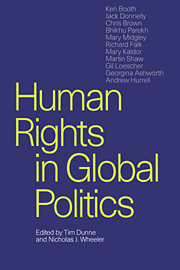Book contents
- Frontmatter
- Contents
- List of contributors
- Preface and acknowledgements
- Introduction: human rights and the fifty years' crisis
- I Theories of human rights
- II The practices of human wrongs
- 6 The challenge of genocide and genocidal politics in an era of globalisation
- 7 Transnational civil society
- 8 Global voices: civil society and the media in global crises
- 9 Refugees: a global human rights and security crisis
- 10 The silencing of women
- 11 Power, principles and prudence: protecting human rights in a deeply divided world
- 12 Learning beyond frontiers
- Index
11 - Power, principles and prudence: protecting human rights in a deeply divided world
Published online by Cambridge University Press: 05 June 2012
- Frontmatter
- Contents
- List of contributors
- Preface and acknowledgements
- Introduction: human rights and the fifty years' crisis
- I Theories of human rights
- II The practices of human wrongs
- 6 The challenge of genocide and genocidal politics in an era of globalisation
- 7 Transnational civil society
- 8 Global voices: civil society and the media in global crises
- 9 Refugees: a global human rights and security crisis
- 10 The silencing of women
- 11 Power, principles and prudence: protecting human rights in a deeply divided world
- 12 Learning beyond frontiers
- Index
Summary
The model of international society that developed in Europe and became global in the course of European expansion provided a political framework that was fundamentally inhospitable to the promotion by states of both human rights and political democracy. It was a society whose normative structure gave only an indirect and secondary role to both individuals and non-state groups. Its normative foundations lay in the mutual recognition by states of each other's sovereignty and their acceptance of the duty of non-intervention. This conception has changed markedly over the past forty years and, for some, still more dramatically with the end of the Cold War. The normative ambitions of international society continue to expand as co-operation has come increasingly to involve the creation of rules that affect very deeply the domestic structures and organisation of states, that invest individuals and groups within states with rights and duties, and that seek to embody some notion of a common good (human rights, democratisation, the environment, the construction of more elaborate and intrusive interstate security orders).
The hugely increased normative ambitions of international society are nowhere more visible than in the field of human rights and democracy – in the idea that the relationship between ruler and ruled, state and citizen, should be a subject of legitimate international concern; that the ill-treatment of citizens and the absence of democratic governance should trigger international action; and that the external legitimacy of a state should depend increasingly on how domestic societies are ordered politically.
- Type
- Chapter
- Information
- Human Rights in Global Politics , pp. 277 - 302Publisher: Cambridge University PressPrint publication year: 1999
- 10
- Cited by



